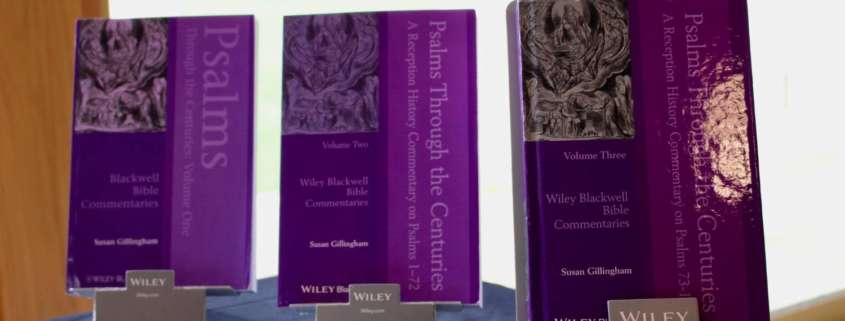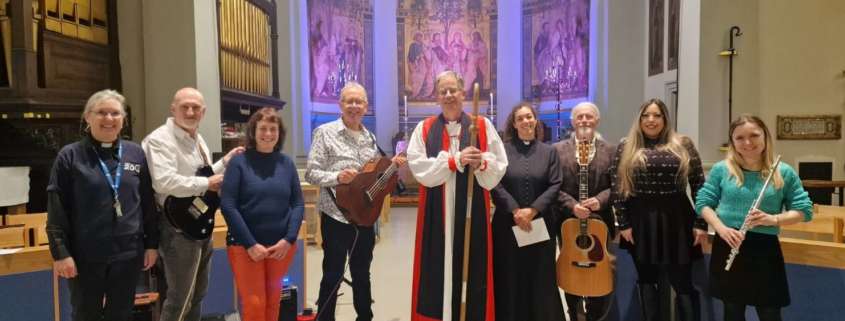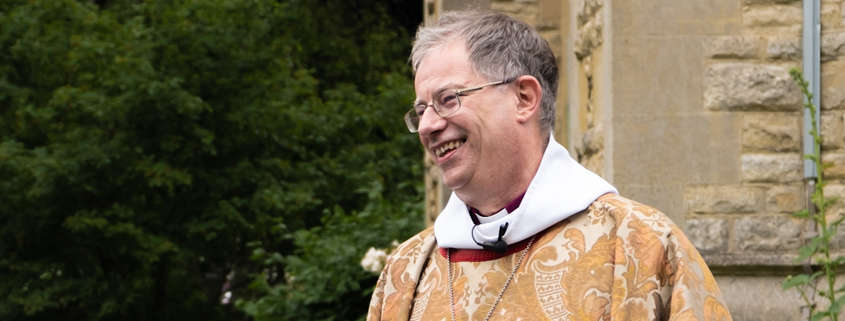Bishop Steven’s speech at the launch event of the Psalms history commentary by the Revd Canon Professor Sue Gillingham.
Posts
A Sermon for the Civic Service of Thanksgiving marking the end of St Mary’s Festival 200.
The Rt Revd Steven Croft, Bishop of Oxford, will be cheering on the England men’s football team in the Euro 2020 tournament.
Lonely planet. 149 million kilometres from small star, on edge of galaxy, rich and full of potential. Afraid (sometimes). GSOH (sometimes). Looking for long term relationship. WLTM saviour.
There are three great truths at the heart of the Christmas story. The first is that humankind needs help. On our own we mess things up very badly indeed.
At the end of 2015, that’s not hard to understand. Look around you. The news has been dominated this year by the migrant and refugee crisis in Syria. Millions of people are on the move. There have been acts of terrorism around the world and on our doorstep: all of them man made. We have polluted the world we live in. Humanity’s greed and selfishness is now affecting the climate and the weather in ways which will affect our children and grandchildren. Yorkshire’s industrial base has declined further this year with the end of deep coal mining and the redundancies in steel. We have terrible examples in our own communities of the way in which people hurt the innocent for their own gratification. The gap between rich and poor in our own country grows ever wider. Many families are fractured. Many are lonely. Many lives lack direction. Who can say we do not need help?
It takes real courage to face these issues. Christmas should be a time when we open our eyes and ears and see the suffering and the pain in the world. Instead it’s become a time when we distract ourselves with food and drink and gifts and pretend everything is fine. Consumption becomes a kind of anaesthetic to deaden the pain we see around us. We cover up our problems for a while and hope they will go away. But that will not happen.
The second great truth is that God really has come to help us. The name Jesus has a special meaning. It means “God saves”. The angel says to Joseph, “You are to name him Jesus, for he will save his people from their sins”.
The world of Jesus day was expecting a different kind of saviour. They were looking for a powerful king, a mighty general, a wise politician who would establish a new government. This is the kind of saviour people still seek today.
Instead God came as a human child, born into an ordinary family. God came in humility and love in a way that everyone could understand. God did not come to the rich and powerful but to the poorest shepherds, to the refugees, to the children. God did not come to establish a new government in a single place and a single time but to offer change and new life to every person in every place in every generation to come.
God became a person to demonstrate his love for the world. God became a person to show us the immense worth and potential of every human life. God became a person to show everyone on earth how to live well: to live with kindness and purpose and grace, to live for others.
Jesus was a real figure in history. He is not made up. He is not a myth. Jesus was born in Bethlehem, an actual place. We set our calendars, still, by his birth. Christians believe Jesus lived a perfect life. But the world cannot tolerate this much goodness and light. He was crucified in his early thirties. Christians believe his death has an immense meaning: through his death on the cross, humankind is set free from all that we do wrong, through his death we can be forgiven. Christians believe that God raised Jesus from death on the third day. In his new life there is new life for everyone.
This brings us to the third great truth of Christmas. This story we tell has the potential to affect every human life, every family, every village, town and city and every nation on earth. This is history which changes us and history which can change the world.
Earlier this year my first grandchild was born. His name is Josiah. When I held him for the first time, something inside me changed. My heart softened. My perspective on time changed. I became determined to be there for him if I could and to be the best grandfather I could be.
That’s a small example compared to what happens when a person becomes a Christian. Christians believe that the living Christ enters into their heart and life. Change begins to happen from the inside out. There is new purpose and a new beginning. Christians don’t become perfect overnight (or ever, this side of heaven). But there is real change and the change inside begins to make a difference outside. We start to join in God’s great change agenda for the world: to work for peace, for justice, to break down isolation, to care for God’s world.
At the end of one year and the beginning of another, remember these three great truths: humankind needs help. God really has come to help us. The story of Jesus has the potential to change every human life and to change this world.
A very happy Christmas to you and to your family
+ Steven Sheffield
This is a key week for the future of the earth. The Climate Change talks in Paris are seeking a global agreement to limit greenhouse gas emissions and prevent global warming above 2 degrees. Many experts believe our target should be more ambitious still: to limit the rise in global temperatures to 1.5 degrees only.
The weather, rather than the climate, was making the news last weekend with the dreadful floods in North West England and South West Scotland. Extreme weather events are just one symptom of global climate change.
Most years in this season I try and write a new hymn or song as the verse for my Christmas card. Writing the verse helps me to begin thinking about the great themes of the Christmas season. This year I have tried to focus on the gift of creation and the earth, our fragile common home.
The first chapter of John’s gospel is always read in Church at Christmas. John 1 speaks of the creation of the world through God’s Word (or reason) and of God’s Word taking flesh to live among us in Jesus Christ. John 1 echoes the beautiful words of Genesis 1 where God creates the heavens and the earth, separating sky from land and sea (“In the beginning….”).
The new carol in turn echoes both of these Bible passages. I’ve also used a couple of phrases taken from the recent letter of Pope Francis on climate change, Laudato Si, which is subtitled: “On care for our common home”. The letter speaks powerfully about discipleship and care for the created world.
Finally, I’ve set the hymn to the well known tune: “The King of Love my shepherd is” – music many people link with God’s love and care for all the world.
You’re very welcome to use the words as a prayer, as a song you sing by yourself or one you use in Church. As you pray, remember those caught up in the dreadful floods this past weekend and those working hard in Paris to prevent the warming of our world.
Creator of our common home
And maker of such wonder
You crafted fire and sky and stone
Dividing seas asunder
In love you set the earth in space
In joy ordained its pathway
Filled earth and sea and sky with grace
That we might praise you always
We turned away your gift of life
Polluted all you gave us
The land was spoiled, we favoured strife
Lives turned away from goodness
In Bethlehem you gave your Son
Creator in creation
To win us back and call us home
Revealing your salvation
The Word of God took human form
Eternity in person
Reason and love came to transform
God’s gift for our conversion
Creator of our common home
Redeemer of such mercy
Sustainer of all life on earth
To you always be glory.
+Steven
Launch of the Crossroads Mission
Welcome to the Archbishop, to all of our visiting bishops and their teams on behalf of the whole Diocese of Sheffield.
We are delighted you are here. We look forward so much to working with you and to your encouragement and friendship in God’s mission across this Diocese.
I want to invite all of the home team to express the warmth and appreciation we feel to those who have come to join us.
This Crossroads mission was born in prayer as the bishops met on Holy Island and prayed together for the north of England. God willing it is the first of many, a symbolic new evangelization of the north.
Our hope for these four days is that we will together sow the good seed of the gospel, the word of God, in many different ways and many different places. Through what we say, through listening, through the love we show, through being there. In the scriptures we offer, through the text messages we will send.
We want to sow that living word with compassion, with gentleness, with courage, with imagination to many thousands of people across this Diocese.
This world God loves is indeed standing at the crossroads and so are many hundreds of thousands of people across this region. Our task is to point them to the ancient paths, the forgotten wisdom of the Christian faith which lies deep in the rock and soil and history of this land. Our task is to uncover the good way again and encourage people to walk in it and find rest for their souls.
We do well to remember as we go that the word of God which we sow is living and active. God created the heavens and the earth through his word. The promise of scripture is that God’s word moves heaven and earth still, especially when that word is proclaimed in the public square.
This seed we bear holds immense potential for life. It will seem a small thing to hand someone a beermat, or offer them a gospel, or speak to them after an assembly or listen at the Show. But that one text or conversation may be the turning point for the whole of their life and the life of their family.
As Jesus says, “the kingdom of God is like mustard seed, the smallest of all the seeds on earth, yet when it is sown it grows up and becomes the greatest of all the shrubs and puts forth large branches, so that the birds of the air can make nests in its shade”. Who can know what will happen because of our work together over these next few days.
All of us, the home team and the away team, are bearers of the gospel. Paul writes these words to the Church in Rome and to the Church down all the ages. Let his words echo round this cathedral today as we go out in faith:
“I am not ashamed of the gospel. It is the power of God for salvation to everyone who has faith”.
In this mission we are saying together, Amen. We are not ashamed of the gospel we bear. We will carry this message to all whom we meet. It is the message that the word of God, God’s very self, took flesh and became a man, Jesus Christ. It is a message of his life and ministry, a message of love. It is the message of his death on the cross for our sins. It is the message of resurrection and new life and Easter joy. It is the message of the gift of the Spirit, the transformation of human lives and the birth of God’s new people, the Church of Jesus Christ.
Thus says the Lord:
“Stand at the crossroads and look and ask for the ancient paths, where the good way lies; and walk in it, and find rest for your souls”.
May God bless each of us as we go and carry this good seed, the gospel of God, to many, many different places. May God bless these communities which we love and serve. May God by his Spirit cause this seed to grow in many different lives in the months and years to come.
Amen.
+ Steven
I spent 3 days last week in Stuttgart in Germany as a guest of the something called the Kirchentag. It’s a great gathering of Protestant Christians from all across Germany. There were 30,000 active participants and over 100,000 visitors to different events all across the city. The programme is half an inch thick and includes conversations on every possible subject.
I was there to meet with German pioneers and to take part in a seminar on the English experience of forming fresh expressions of church. But the whole event got me thinking…. Why can’t we do something on this scale in Sheffield?
So how about an annual Sheffield Christian Festival? One which tries to draw together every stream of the Christian church in the city and region and celebrates our common faith? A blend of Greenbelt and Taizé and New Wine and Soul Survivor and Spring Harvest and Walsingham only right here in this city and region. Can you imagine it?
Sheffield is already a city renowned for its festivals. We have DocFest and a live music festival and a comedy festival annually. We have strong local festivals in many parts of the city. Why not a celebration of Christian faith right here where we are?
I’ve been reflecting for some time on the absence of strong Christian festivals in the north of England, especially since the demise of New Wine North a couple of years ago. I’ve been trying to imagine how we could start slowly and build something here: perhaps camping out on Doncaster racecourse or Beauchief Abbey.
But camping is not really that appealing. And it would be hard to offer something for everyone in a single event or style. So how about something stretching over a long weekend which draws people into the city and celebrates all the different churches have to offer? Isn’t it the kind of thing a humble, confident church should be doing?
Almost 25 years ago the churches of this city and region combined in a remarkable way for Mission England. Many still remember that as a high point of collaboration. There was much fruit. Over the last couple of months there has been a new beginning with church leaders from different streams coming together to pray. Perhaps the idea of a City Festival is part of the answer.
I’m the kind of person who sometime has ten ideas before breakfast. Not all of them are good ones. Those who work with me sometimes bear the scars and have learned to sit on me from time to time.
But every so often, there’s one which is worth pursuing. How about it? An ecumenical, regional, annual Festival of Christian Faith in Sheffield to build up the churches, to strengthen faith and discipleship, to witness to our common faith, to celebrate God’s love and make an impact across our region. First one in 2017?
Let me know what you think either by posting a comment or by email.
+Steven Sheffield
The Cathedral held a dawn service on Easter Day this year. I set the alarm for 4.30 in the morning for a 5.30 start.
The service began in darkness: readings and prayers from the Old Testament looking back to creation, to the Exodus, to the prophets longing for God’s kingdom. As dawn broke, we moved outside to the great entrance. New fire was kindled in a brazier. We lit the new Easter candle.
Together the congregation moved into the Church proclaiming with wonder once again this profound and life changing news that Jesus Christ rose from death on Easter Day.
The Christian faith is not based on a dream or a projection or a myth but an event in history. This event was witnessed by those who were not expecting it, unexplained by those who opposed it, written down by those who gave their lives in testimony, and attested by countless generations of Christians who have themselves encountered the risen Christ in scripture and sacrament, in prayer and fellowship.
This is the life changing, death disarming, fear destroying, mind transforming, joy bringing, grief shattering, kingdom proclaiming, history making, culture shaping truth that Jesus Christ rose from the dead on the third day. God offers to everyone forgiveness and new life.
But how can anyone believe in the resurrection of the dead? Death seems so final.
St Paul uses this very simple picture in 1 Corinthians 15. He asks us to imagine seed: the kind you plant in the ground. Think of the pip in the apple, or a sunflower seed, or the stone in the heart of a peach.
No matter how long you look at a dried peach stone, no-one could possibly imagine that this hard, dry object could possibly change and not only change but grow and not only grow but become a whole tree, bearing leaves and flowers and fruit for years and years.
So it is with the resurrection of the dead, says Paul. Death seems so final. But we only see part of the picture. A person’s life and soul and personality rests with God after death, like the DNA hidden deep in the stone of a peach. God in his love and grace and power is able to raise them to a new and deeper and richer kind of life, life without end.
How can we know this to be true? Because of what Christians celebrate in the fifty days of Easter.
Christ is risen. He is risen indeed. Alleluia.
+Steven
On Thursday of this week, I will be taking part in two profound symbolic actions in the Cathedral which have humility at their very heart.
The first is the Royal Maundy. Her Majesty the Queen will distribute gifts to eighty-nine men and eighty-nine women, honoured for their service to church and community. The tradition goes back hundreds of years and looks back to the moment at the last supper when Jesus knelt and washed the feet of his disciples.
It was at that moment when Jesus gave his disciples a new commandment: love one another. We take the name Maundy from the Latin for new commandment (novum mandatum). The gift of money is a symbolic and practical expression of love for others and, especially, love for the poor.
The recipients gathered in the Cathedral a couple of weeks ago for the Maundy Lecture. The Lord High Almoner told us that the Maundy is the only honour in our national life where the Queen comes to the recipient: she not only travels to Sheffield but also moves within the service to each person to make her gift – a moment we will never forget.
Later that same day, after the royal party have left the city and the crowds have gone, the Cathedral community will gather, like many others all across the Diocese to remember the events of the Last Supper. In that service, I will take a towel and a basin of water, as Jesus did, and wash the feet of twelve of the congregation. The service is a powerful reminder to follow the example of Jesus who came not to be served but to serve.
The theme of humility runs through Holy Week. Jesus enters Jerusalem on Palm Sunday riding on a donkey. He is arrested whilst praying in a quiet garden. He is silent for much of his trial. He responds to mockery, to violence, to danger with gentleness. In his own agony and passion, he tenderly cares for his friends.
I offer two reflections on these two actions. The first is that humility remains an essential part of all leadership: in the family, in the church, in the wider community. The Christian tradition of reflection on leadership in communities goes back over three thousand years: it is the oldest and richest seam of reflection on leadership the world has ever known. At its very heart, all the way through, however you slice it, is this profound and wonderful quality of humility as essential for wise and good leadership in communities.
Our nation will be thinking a great deal about leadership over the coming weeks in the General Election campaign. Humility is essential as part of that debate in the qualities of the candidates, in the promises which are made, in their vision for this city and region and for the life of our nation.
But, second, humility is not just for leaders. The foot washing can be misunderstood. The lesson Jesus draws is very clear. He does not say: “So if I have washed your feet so your leaders should wash the feet of those they serve”. Jesus goes much, much further: “You ought also to wash one another’s feet”.
Each of us is called to humility. Each of us is called to love and to serve. This calling is rooted in Christ’s love for us, Christ’s offering of himself for us. Humility is to be at the heart of all we are.
+Steven Sheffield
 Twenty-one bishops from across the north of England are visiting the Diocese of Sheffield in September for four days of mission together, led by the Archbishop of York. We’ve called the mission “Crossroads”.
Twenty-one bishops from across the north of England are visiting the Diocese of Sheffield in September for four days of mission together, led by the Archbishop of York. We’ve called the mission “Crossroads”.
As far as I know, it’s the first time so many bishops have worked together in mission in this way in a single Diocese in the long history of the Church of England. Many are bringing teams of young adults to work with them. The Bishops are from every Diocese in the Province of York and from every tradition. They include the most recent Bishops to be consecrated for the north: Bishop Libby Lane of Stockport and Bishop Philip North of Burnley.
After an initial service of commissioning in the Cathedral on Thursday 10th September, the Bishops will be assigned to different deaneries. They and their teams will stay with clergy and parishioners. The Bishops and their teams will lead hundreds of different community visits and events on Thursday, Friday and Saturday. They will join in services in local parishes on Sunday morning (13th). We will end the Crossroads mission with a single, large scale event on Sunday afternoon (details to be announced).
Born in prayer and carried forward in prayer
This four day mission to the Diocese of Sheffield was born in prayer. In May 2014, the Archbishop of York invited all the bishops of the north to join him for 36 hours of prayer on Holy Island, one of the cradles of Christian faith in northern Britain.
One of the convictions born in the bishops as we prayed together was that God was calling us to engage in evangelism together to the North of England. The idea was born of bishop’s visiting one Diocese each year in sequence, if possible with teams of young adults. The dates are already booked for similar missions to Blackburn next year and Durham in 2017.
This means that Bishops across the Province will be praying for us and later this week, Bishops will be linked with the Deaneries they will be visiting in September.
However the four days of mission also needs to be rooted in prayer in this Diocese and I would ask that it is the focus of regular prayers and that we pray together for many people to hear the good news of Jesus through that four days in September.
What’s the aim of the mission?
Our aim is to sow the good seed of the gospel in many different places in September. We want to go to people who are currently outside or on the edge of the Church. Our hope is that through Crossroads, many people will join enquirers courses in the autumn and come to a living and lifelong faith.
We work together and in partnership with God’s grace in an annual cycle of sowing the seed of the gospel in the summer and early autumn; offering groups for enquirers and new believers from October to Easter and deepening the discipleship of every Christian from Easter to the summer. The Crossroads mission exactly fits this pattern.
What can we do now?
Area Deans will begin to plan what will happen in your deanery from Easter onwards. Please begin to think how your own parish could engage with Crossroads. We’ll be producing some special materials to help with this in due course.
In the meantime please pray for the whole mission for God’s grace and blessing on all that we do.
Here is a bible verse and a prayer to help you begin your preparation:
“Stand at the crossroads, and look, and ask for the ancient paths,
where the good way lies; and walk in it, and find rest for your souls”
Jeremiah 6.16
Loving God,
This world you love
stands at the crossroads.
Help us help others
to discover your Way
to know your Truth
and to share your Life
in your dear Son, Jesus Christ.
Inspire us by your Spirit
to sow the good seed of the gospel
throughout this Diocese
with imagination and compassion,
that many will come to know you
and many will be strengthened in their faith,
Through Jesus Christ our Lord
Amen.




